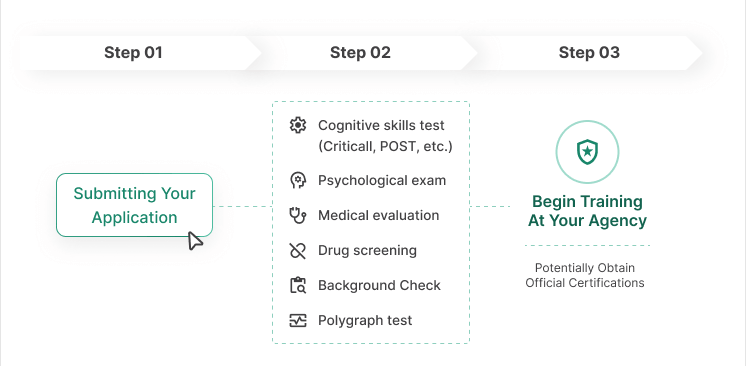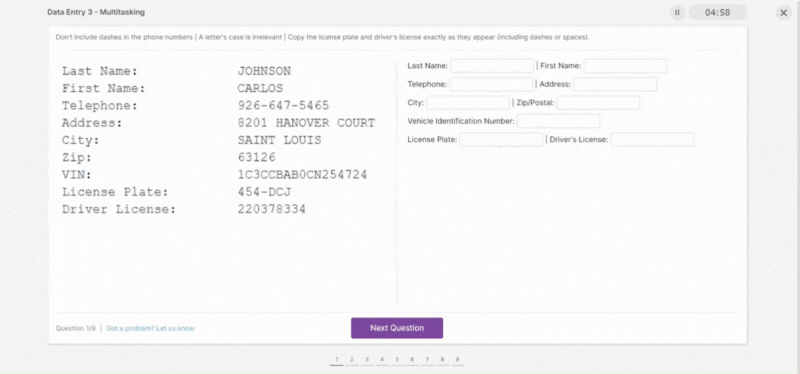911 dispatchers, also known as 911 telecommunicators, are public safety communications officials who are trained to perform a critical role in law enforcement. They take emergency calls, question the callers to gather vital information, often employing commandable tact and empathy, and dispatch the relevant emergency responders to each case.
Becoming a 911 dispatcher requires candidates to undergo drug tests, background checks, and cognitive and psychological evaluations.
This page explores the dispatcher test, also known as the dispatcher aptitude examination. It aims to help you prepare for the 911 dispatcher test using the most accurate and up-to-date practice.
If you know what test your agency uses. you can select it here, or continue reading about the 911 dispatcher recruiment process.
Jump to: Dispatcher Recruitment Process | The Dispatcher Exam
Emergency dispatch operators enjoy stable work, with substantial benefits, and better pay than average customer-facing jobs, especially those that do not require a college degree.
Many candidates seek to join emergency dispatch agencies as a stepping stone to becoming sworn law enforcement officers or to benefit from the high-stakes yet fulfilling and meaningful nature of the job.

If you're on a path to becoming a 911 dispatcher, this page will cover the typical hiring process for agencies in the United States and Canada. We will focus primarily on what many consider to be the most stress-inducing part: the cognitive aptitude exam. Let's first go over the steps to joining an emergency service provider as a dispatcher.
How to Become a 911 Dispatcher?
The process for becoming a dispatcher can take several months from start to finish.

To start your journey towards becoming a police dispatcher, you must first possess good communication skills, the ability to endure stress and keep your cool in emergency scenarios, and the willingness to contribute to your community.
Next, make sure you meet the minimum requirements for the job:
-
Be at least 18 years of age
-
Be eligible for a high school diploma or a GED
-
Have no criminal history
-
Often, have a valid driver's license (though this is not universal)
-
Some states require candidates to obtain certifications from various federal agencies before or during their first year of employment. Your employers will walk you through any request they have.
Tip: Is a college or its equivalent necessary to become a dispatcher?
Whether or not graduating from a formal academic program is required for joining dispatch agencies depends on your goals.
Some candidates aspire to advance in the field of law enforcement and envision themselves holding managerial positions in the future. In such a case, a college degree may boost their portfolio and even be considered as experience by some agencies.
This is especially true of degrees in related fields such as public safety, communications, homeland security, or criminal justice.
If you meet these qualifications, the first step is to apply.
911 operators work at facilities labelled public safety answering points or PSAPs. This is where 911 calls get routed. You can see a list of all PSAPs on the Federal Communications Commission (FCC) website. You can contact an FSAP directly near your location, or alternatively, search for job listings on online career boards.
What Happens After I Apply?
Once your application has been submitted, your CV will be considered alongside those of all other applicants. If you are chosen to proceed, you will likely need to undergo a series of interviews, including one-on-one interviews and panel interviews, as well as complete a background check, drug screening, medical exam, polygraph test, and mental health evaluation.
At some point throughout the process, you will be faced with a skills test. In the USA and Canada, this is usually the Criticall Exam, although some agencies prefer to use POST or ECOMM.
These tests are administered on a computer to simulate the computer-aided dispatch you will perform at work.
Let's go over the test:
What Is the Dispatcher Test?
The dispatcher test is a selection procedure used by public safety agencies to screen candidates for the position of a 911 operator. Its goal is to hire people who have both the knowledge and ability to help someone in an emergency situation.
The Dispatcher exam usually consists of more than 10 test sections that evaluate different areas of aptitude. These areas include typing, listening, reading, setting priorities, speech recognition, memory, map reading, spatial orientation, and more.
Is the Dispatcher Test Hard?
The Dispatcher test is considered a hard exam since it simulates the challenging tasks of actual 911 dispatchers and because of the strict time limits in some of its modules. Also, since most candidates take the exam without any prior dispatch experience, they're often overwhelmed by its unique sections, such as multitasking, call summarization, and more.
That being said, it's definitely possible to prepare for this test and succeed, even if you have zero experience. That's because you can learn and improve all the skills and abilities that are being evaluated on this test.
Dive deeper into what it takes to become a 911 dispatcher, or explore the various dispatcher assessments and how to best prepare for them
What 911 Dispatcher Test You'll Likely Take
Most candidates for the many public safety dispatcher jobs in North America (911 operator, 911 call-taker, police dispatcher, emergency dispatcher, and more) take one of the following tests (click to jump to its section on this page):
CritiCall Test
The CritiCall test is the most widely used exam for 911 dispatchers in the United States and Canada. This test replicates the daily tasks of a 911 dispatcher, helping to evaluate the key abilities needed for success during training and in the actual role.
The CritiCall consists of multiple test sections, named "modules." Each agency chooses its modules from a pool of 25 sections, based on its needs and type of work.
The most common modules across agencies are typing, decision-making, data entry, call summarization, cross-referencing, and map reading.
Here’s an example of a CritiCall map reading question that closely mirrors the types of questions you’ll encounter on the actual exam.
CritiCall Map Reading Module

A man fainted at a grocery store on Lord Cir. A dispatcher ambulance is currently parked on the narrow road next to the medical center, between 29th St and King Cove.
What is the most direct route of the ambulance to reach the Lord Cir entrance of the grocery store?
CritiCall Test Prep
CritiCall's map reading questions come in two main forms:
- Best Route: You'll be tasked with identifying the shortest, most direct path between two points.
- Orientation: You'll need to follow specific directions from a starting point to determine your final location.
Our CritiCall Preparation Pack includes a comprehensive Map Reading guide and 13 practice tests, offering hundreds of questions and a wide range of map types to help you master these skills.
CritiCall Data-Entry Module
The CritiCall Data Entry test assesses your ability to accurately and efficiently input information, such as names, license plate numbers, VIN numbers, addresses, and phone numbers, into the correct fields.
There are two formats for the Data Entry test:
- A split-screen format where the data is displayed on one side, and you must enter it into the empty fields on the other side.
- An audio version where you listen to an emergency call and enter the information you hear into the designated fields.
Your performance will be evaluated based on how quickly and accurately you input the data into the correct fields. Additionally, you'll need to respond promptly to any emergency messages that appear at the bottom of the screen
If you fail to respond to a decision-making message within 15 seconds of it appearing, your score will be negatively impacted.
Here is an example question taken from the JobTestPrep preparation.

JobTestPrep’s CritiCall preparation pack includes thorough practice for the Data Entry part, which is one of the most important modules of the exam. This practice will help improve your data entry skills and multitasking abilities (multitasking between data entering and responding to emergency messages).
To learn more about the test structure and access its full preparation pack, visit our CritiCall prep guide.
For additional CritiCall sample questions (with full answers), go to our Free CritiCall Practice Test.
Moving forward, let's explore the POST Dispatcher Test.
POST Dispatcher Test
The POST Dispatcher test measures abilities that are both essential for the successful performance of dispatcher duties and necessary for candidates to possess before hiring. These abilities are divided into four areas: verbal, reasoning, memory, and perceptual abilities.
The test, which is mainly used by agencies in California, consists of 11 short exams, ranging from 5 minutes to 15 minutes per test. The entire test battery takes between 2 to 3 hours to complete, including a short break.
Let's try a 'reasoning' sample question that resembles the actual test:
POST Sample Question
The following steps should be followed when approaching a crime scene. (These steps are not listed in the correct order.)
- Evaluate what kind of physical evidence may be present
- Capture the scene photographically
- Initiate a preliminary survey of the scene
- Prepare a narrative of the scene
- Conduct a detailed search of the scene
- Secure and protect the scene
- Record and collect evidence
Visit our POST Dispatcher test prep page for more sample questions with answers and to access the complete prep pack for this exam.
Police Communications Technician Exam
The Police Communications Technician Exam, also known as the NYPD 911 Operator Exam, is 85-questions long and takes 2 hours and 45 minutes to complete. It assesses your abilities in 7 sub-areas, which are important for performing the duties of a 911 operator/radio dispatcher.
NYPD 911 Sample Question
Read the RULE carefully and answer the question.
RULE:
A correctional officer whose life is not being threatened may not shoot a violent inmate with a rifle or handgun unless it is a .22 caliber rimfire using rubber, sand, or rock-salt ammunition.
Which of the following is in violation of the RULE?
For additional sample questions and practice tips, and to access the complete prep pack for this exam, visit our NYPD 911 Operator test guide.
National Dispatcher Selection Test (NDST Exam)
The National Dispatcher Selection Test (NDST) is used to evaluate the candidate's abilities in handling emergency calls, prioritization, decision-making, and teamwork. The exam takes about 85 minutes to complete and consists of between 83 to 113 questions.
It includes five sections designed to measure different aspects of dispatchers' performance
- Reading Comprehension
- Listening
- Problem-solving
- Prioritizing
- Multitasking
What If I Don't Know What Test Is Used By My Agency?
If you don't know what test is used by the agency you're applying to, we encourage you to contact your potential employer. Ask them for a detailed description of the selection process, including the pre-employment tests and other test administration info.
By getting this information beforehand, you'll know exactly what test to prepare for, and increase your chances of passing it.
What Topics to Expect on the Most Common Dispatcher Tests?
Several test sections are mutual to all 911 dispatcher tests in the U.S. and Canada. Here's a partial list of them - the full list is located on each exam page on our site.
Typing
To work as a public safety dispatcher, you have to possess a typing speed of at least 35 words per minute (WPM). On some tests, applicants are given one or two typed sentences and asked to type them accurately within 45 seconds or 60 seconds respectively.
In addition to these timed typing tests, you may be also asked to type a portion of text from memory in a certain amount of time.
There is also an audio typing test you might encounter. It works in the same way, except that instead of typing on the computer keyboard, you listen to an audio recording and type everything you hear.
Data Entry
The Data Entry section of the test is used to assess the candidate's dexterity and speed in handling data. Usually, it takes 10-30 minutes and the entries might include the caller’s name, the location of the incident, and the type and severity of the emergency.
Memory Recall
When testing your memory and recall abilities, the examiners want to see if you're capable of remembering details in crisis situations. This section of some tests may include a story with several parts or a set of instructions that you have to follow correctly.
Multitasking
During the multitasking section of a 911 operator exam, you'll be asked to perform several tasks simultaneously. You might have to answer multiple calls, type and listen at the same time and understand what's being said without missing any information.
Spelling
In addition to typing speed, spelling is also tested during the selection process. Some tests may include a list of basic spelling errors you have to find and correct in a given time.
Some tests might also require entering information into a database or query system by providing exact or partial matches for certain keywords.
Spatial Orientation / Map Reading
Another useful skill for 911 operators is the ability to read a map and figure out where an incident takes place.
On some tests, you may be given a large, detailed map of your area or state with several red dots that represent calls. To pass this section of the test, you have to find all the call locations and type them correctly on a computer keyboard or verbally into a phone.
Learning how to become proficient at reading large-scale maps can help you improve your score in this specific section of the dispatcher exam.
Prioritizing
Public safety dispatchers have to make critical decisions about where they are going to send emergency units and how they're going to organize their teams and resources.
Some tests may include a series of incidents, each with several steps or solutions you should select from. You'll be expected to prioritize the most important tasks and follow proper communication protocols.
Reading Comprehension / Written Comprehension
It's very likely that one or more reading comprehension tests will be administered during your selection process. These written tests are designed to measure how well you understand what you read and determine if you can make quick decisions based on the information provided to you.
Listening Comprehension
Listening comprehension tests can be administered in several ways, but the most popular format is to listen to a recording or a call that represents an actual emergency situation. As you listen, you'll have to answer questions and type your answers into the computer.
Deductive Reasoning
Dispatcher deductive reasoning tests assess how quickly you can make sound judgments based on the information provided to you. The questions may require you to follow a series of steps and answer them in the correct order.
Character Comparison
Character Comparison questions are used as another important tool to assess your decision-making skills. You'll be shown several pairs of characters and have to figure out which of the elements in each pair does not match.
How to Prepare for the 911 Dispatcher Test?
The best way to study for the Dispatcher test is by practicing the same question types you'll face on the real test together with the same tight time limits. This will ensure you know how to work fast while making as few mistakes as possible.
JobTestPrep has created accurate preparation packs to help you practice for almost any Dispatcher exam in the country.
Visit the dedicated pages on our site to access the prep packs:
Other Dispatcher Roles
So far, we have covered how to become a dispatcher in the law enforcement industry.
Aside from 911 operators working for emergency service providers, dispatch centers exist in a variety of other sectors. These include:
-
Transportation and logistics roles like freight and shipping, trucking, and public transit
-
Telecommunication, electricity and water services
-
Air traffic control and flight operations at airports
-
Non-emergency medical transportation.
How Do You Become a Dispatcher?
Most dispatcher positions require a high school diploma or equivalent credentials. You can further enhance your qualifications by taking courses in communication, logistics, and computer skills - particularly MS Excel.
Some industries, particularly emergency services, may require specific certifications. For example, emergency dispatchers often need to complete certification programs offered by organizations like the International Academies of Emergency Dispatch.
After applying online, you may learn that dispatcher roles require pre-employment screening assessments. We have put together a general-purpose pack to simulate and prepare candidates for these assessments.
If you are looking for a different test, or are not sure which test is relevant for your position, contact us, and we'll do our best to ensure you get the most accurate preparation for your upcoming exam.





